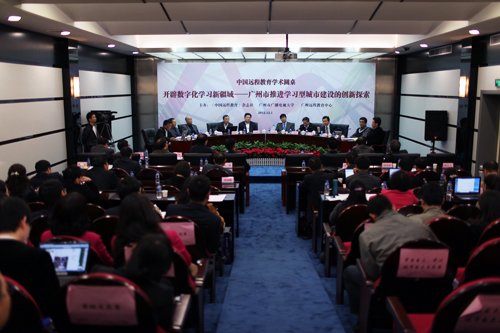
Co-hosted by Distance Education in China, Guangzhou RTVU, and Guangzhou Distance Education Center, and entitled “Open up a New Field for E-Learning — Innovations and Explorations on the Construction of Learning-Oriented Guangzhou”, the 23rd Roundtable Conference on Distance Education in China took place in Guangzhou on December 1, 2012.
The conference explored how Guangzhou RTVU could help alleviate problems faced by programmes aimed at promoting Guangzhou as a learning-oriented city and how to promote the implementation of their findings.

The conference was hosted by Zhu Jian, deputy Party secretary of Guangzhou RTVU. Presentations were given on a wide range of subjects, including: Research on Network Community Practices in Local Teachers’ Professional Development — Transition of Distance Training Model for Primary and Secondary School Teachers in Guangzhou, Practices and Explorations on E-learning by the Digital Teachers’ Union to Promote the Construction of a Service-Oriented Union — Guangzhou, Actively Promoting University & College E-learning Services for the Development of the Local Economy and Society — Research on Workplace English Programmes by Guangdong University of Foreign Studies, and On the Promotion of Learning-Oriented Guangzhou Construction, were delivered by Wu Qiang, deputy director of the Guangzhou Bureau of Education, Zheng Yiyao, inspector for the Guangzhou Federation of Trade Unions, He Yongbin, dean of the College of Continuing Education of Guangdong University of Foreign Studies, and Lei Zhongliang, deputy director of the Guangzhou Bureau of Education. The presentations focused on the results of studies and research in Guangzhou as to how best to promote the development of a learning-oriented society. Zhang Xiaohua, president of Guangzhou RTVU, Xie Wei, general manager of the Guangzhou Distance Education Center, and Zeng Hai, director of the Staff Education Management Office of Guangzhou RTVU, also attended the conference and delivered lectures entitled: Open up a New Field for E-Learning —Innovations and Explorations on the Construction of a Learning-Oriented Guangzhou by Guangzhou RTVU, Promote a Learning-Oriented Society Through a Local Public E-learning System, Digitization, Standardization, Specialization, Branding — A Model for developing the Guangzhou Digital Learning Harbor, and Stick to High-quality Online Learning — Practices and Explorations by Guangzhou Digital Learning Harbor. The lectures mentioned above thoroughly explored the results of Guangzhou RTVU's research into how to promote the learning-oriented Guangzhou project.
Yan Bing, vice president of the Open University of China (OUC) and editor-in-chief of Distance Education in China hosted the discussions between experts. They fully affirmed the role played by Guangzhou RTVU in promoting local economic development, social development, and the construction of a learning-oriented Guangzhou. Their discussions also covered the following issues: the deep integration between IT and education in Guangzhou; innovations in developing a learning-oriented Guangzhou; new insights gained through Guangzhou RTVU and Guangzhou Distance Education Center's recent e-learning construction projects; recent innovations in how to promote the construction of a learning-oriented society from the perspectives of theory, mechanism and value orientation; how to view the roles played by the government, society, universities, colleges, industries, enterprises and their relationships to one another; how to advocate the deep integration between IT and education in the construction of a learning-oriented society; practical ways to implement the national IT education strategy; how to implement the construction of a learning-oriented society while tackling problems with bottlenecking, and workable solutions.
At the end of the discussions, Yan Bing pointed out that Guangzhou RTVU played a leading role in exploring the construction of a learning-oriented Guangzhou. The results of the above mentioned collaborations was the Guangzhou Model, which merits further attention. Yan Bing also expounded five personal ideas about the findings of Guangzhou RTVU: 1. Joint innovation. The construction of a learning-oriented society is a major issue in modern social development, and requires cooperation. Research and results obtained by Guangzhou RTVU are thus unique and valuable. 2. Deep integration. Findings on IT education, integration of education and IT, and solutions to bottleneck problems by Guangzhou RTVU will be used to evaluate the feasibility of future distance education programmes. 3. Tackle bottleneck problems. Guangzhou RTVU has made concerted efforts to solve bottleneck problems, which command our respect. 4. Focus on research. Guangzhou RTVU encourages questions and research, which embodies the new trend in education research. 5. Strategic transformation. Guangzhou RTVU also promotes continued transformation in major areas such as: how Radio and TV Universities in major cities can promote the construction of open universities and contribute to the building of learning-oriented cities; how to encourage innovation, improve personnel cultivation, and improve the overall quality of open universities.
A total of almost 100 people attended the conference, including leaders, directors and related personnel from Guangzhou RTVU, from 13 other RTVUs in major cities, and from the OUC.
As with the 22 conferences that preceded this 23rd Roundtable Conference on Distance Education in China, the focus was on promoting the implementation and application of distance education theory and practices, while also serving as a platform for academic collaboration.
By He Jing